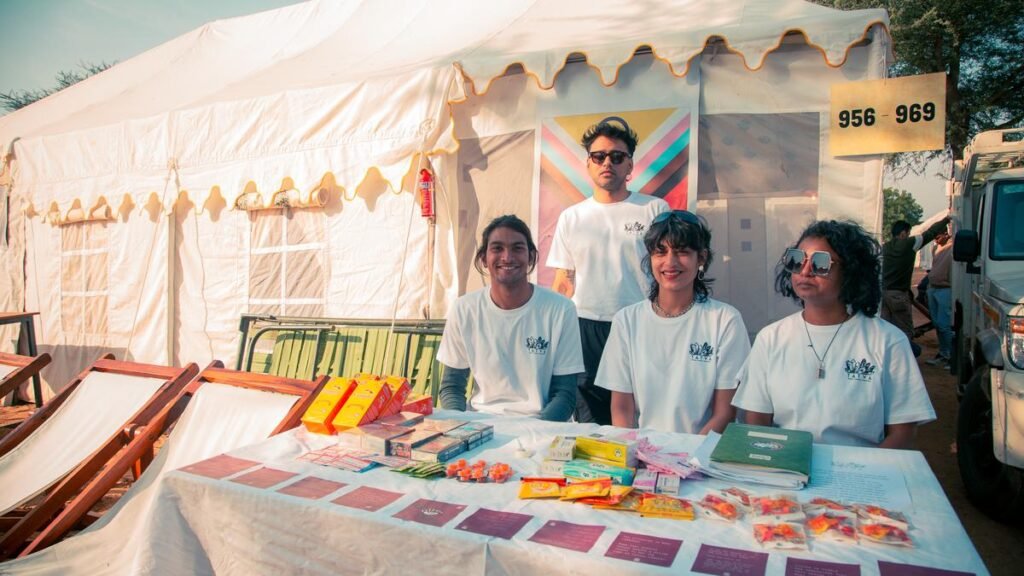Music festivals are embracing support services and mindful spaces for a better experience

Adarsh, a 32-year-old data analyst from Mumbai, frequently attends music festivals. Alongside his enjoyment of a gin and tonic while immersed in music, Adarsh has another ritual — he admits to smoking a joint or two before a concert, citing the buzz it adds to the experience.
However, a particularly crowded music festival in 2022 left him with a terrible buzz, exacerbating a panic attack. Attending these events solo, Adarsh found himself sweating profusely and feeling nauseous. “I asked a volunteer for water and allowed my body to readjust before deciding to go home. I vowed never to attend a concert stoned,” he says.
Adarsh’s experience is not uncommon, as numerous concert-goers tend to immerse themselves fully in the vibrant atmosphere of music festivals. It is worth noting that feeling unsettled at a concert does not always originate from the use of recreational drugs or alcohol; sometimes, it can be a bodily reaction to the intense stimuli of a particularly energetic and lively environment.
Recognising the importance of emotional health in such situations, music festivals are taking steps to ensure attendees have a safe space to turn to when needed. Emotional welfare booths are emerging as holistic support centres, addressing not only mental health needs but also assisting with physical well-being.
Concert goers at Bacardi NH7 Weekender, in Pune
| Photo Credit:
Special arrangement
Emotional TLC
Many global music festivals now offer welfare support alongside medical services to enhance attendee well-being. Glastonbury Festival in the UK features ‘Sanctuary’ areas with mental health professionals, while Burning Man’s ‘Zendo Project’ provides emotional support, especially for those navigating difficult experiences. Tomorrowland has a ‘Comfort Zone’ for mental health assistance and comprehensive first aid. Coachella offers harm reduction resources and medical tents, while Boom Festival, which is held in Portugal, prioritises wellness with its ‘Kosmicare’ service, supporting those in emotional distress.
In India, however, these resources at festivals are few and far between. Tatva, an international emotional well-being organisation, has been setting up a caring space at the Magnetic Fields music festival in Rajasthan for over five years now. Sarah Chawla, the co-founder of Magnetic Fields, emphasises the importance of this service. The collaboration has extended beyond welfare, with the festival’s core security team participating in a four-hour sensitivity training workshop, showing a commitment to evolving and prioritising the well-being of attendees each year.
The welfare team plays a crucial role as a mediator between accidents and incidents involving attendees, security, and medical support at the music festival. Serving as the first responders, the team is equipped with LBGTQIA+ sensitisation, training in bystander intervention, and the ability to provide support through active listening and guidance. “The welfare area serves as a space for patrons to drop in for conversations, access sex-positive information, learn about consent culture, report any incidents of discrimination or harassment, and find respite during the day or warmth at night,” says Kripi Malviya, creator at Tatva Centre.
The welfare team plays a crucial role as a mediator between accidents and incidents
| Photo Credit:
Special arrangement
First responders
Bacardi NH7 Weekender, the annual music festival in Pune, is also committed to fostering an inclusive environment that prioritises both the physical and emotional well-being of its attendees. For two consecutive years, the festival has set up support booths to assist anyone feeling overwhelmed or experiencing harassment or bullying, particularly regarding issues related to sexuality, ensuring a safe and supportive atmosphere for all festival-goers.
“This initiative plays a pivotal role in fostering a more holistic concert environment by addressing the emotional well-being of festival-goers, especially attendees who may experience higher-than-normal reactivity to certain sounds, lights, or crowds. We wanted to convey to attendees that their mental health is a top priority,” says Ashish Jha, brand manager of Bacardi and Breezer India.
The 14th edition of Bacardi NH7 Weekender, which was held in early December last year, onboarded Mist LGBTQ Foundation (a Pune-based collective founded in 2009) as an inclusivity partner. The founder of the foundation, Shyam Konnur, and his team of volunteers were seen waving the Pride flag at the venue, manning the grounds to reach out to anyone who might need psychological first aid.
In turn, Mist onboarded another Pune-based mental health service, Mindworks Counselling, to help them administer psychological aid. “While we didn’t see a high number of people seeking psychological first aid, we did encounter a few who opted for on-the-spot consultations for a future therapy session. Understanding the unique challenges and experiences associated with these events allows us to be more responsive and effective in offering support during on-the-spot consultations,” says Armeet Narang, a psychologist at Mindworks Counselling, who was stationed at the designated booth allotted by the festival. This booth included a separate section behind it, specifically for concert-goers experiencing a panic attack.
Armeet says that a music festival can present various scenarios where individuals may encounter challenges related to their mental well-being. Overstimulation is a common issue, with the abundance of noise and the sheer number of people contributing to heightened anxiety. Symptoms such as a racing heartbeat, palpitations, and breathlessness can escalate into a full-blown panic attack.
Volunteers at Magnetic Fields man the ground to report any untoward incidents
| Photo Credit:
Special arrangement
There is also the concern of potential harassment or molestation. Such incidents can trigger the fight or flight response, leaving individuals uncertain about how to react. Having a designated safe space becomes crucial in these situations. Armeet adds that the consumption of alcohol and drugs can significantly influence mood, either amplifying it, bringing it down, or potentially leading to a “bad trip.”
Moreover, the festival setting introduces the possibility of attendees getting separated from their friends, causing anxiety, especially in areas with poor network connectivity. In such instances, individuals may find themselves feeling lost and unsure about what steps to take.
A step forward
For the second edition of Lollapalooza India, held in January this year, organisers took a significant step by collaborating with experienced partners to address real-time mental and emotional health concerns. This collaboration aimed to create a secure environment for all festival attendees. Trained counsellors were present on-site, offering immediate assistance at a dedicated safe space. The festival also implemented Quick Response Teams (QRTs) to provide on-ground support for psychological safety and inclusivity, particularly focussing on sexual assault prevention.
Festival organisers want to ensure that their event is an emotionally enriching experience too
| Photo Credit:
Special arrangement
“Prioritising inclusivity, the festival took various measures such as sensitising the crew and staff on gender-related aspects, pronouns, and consent. This extended to interactions with attendees during interventions, facilitating gender-neutral entry and security checkpoints, and providing gender-neutral washrooms at the festival. The efforts also included addressing distress calls and escalations for non-binary/queer folx,” says Owen Roncon, chief of business – Live Entertainment at BookMyShow.
This proactive approach underscores the evolving culture of care and inclusivity within music festivals, striving to ensure that the event is not only physically but also emotionally enriching for everyone involved.
Published – November 02, 2024 08:30 am IST







